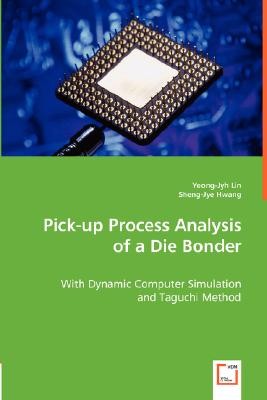
- We will send in 10–14 business days.
- Author: Yeong-Jyh Lin
- Publisher: VDM Verlag Dr. Mueller E.K.
- Year: 2008
- Pages: 136
- ISBN-10: 363900034X
- ISBN-13: 9783639000344
- Format: 15.2 x 22.9 x 0.7 cm, minkšti viršeliai
- Language: English
- SAVE -10% with code: EXTRA
Reviews
Description
The gallium arsenide (GaAs) circuits in advanced communication application have been considered to profoundly supersede the con-ventional silicon-based counterpart. Great improvements in the packaging of GaAs devices are needed to overcome the imminent handicap of its fragile characteristic; Thin die represents the main-stream for IC packages to achieve the goal of manufacturing compact and light products with higher functionality. These trends tend to challenge the existing infrastructure, henceforth; the creative design in connection with a unique die bonder in fabrication has been presented in this book. The general process to pick up a die was comprehensively investigated and then analyzed with computer simu-lations. Experiments were conducted to verify the simulation results. The die cracks due to the ejecting needle; and the effects of parameter were analyzed by means of Taguchi Method. With this procedure, not only the parameters could be optimized but also the production yield was promoted. Besides, this method could be easily modified to simulate other type of die bonders with different mechanisms; even a new procedure could be derived for the next generational die bonder.
EXTRA 10 % discount with code: EXTRA
The promotion ends in 23d.09:07:35
The discount code is valid when purchasing from 10 €. Discounts do not stack.
- Author: Yeong-Jyh Lin
- Publisher: VDM Verlag Dr. Mueller E.K.
- Year: 2008
- Pages: 136
- ISBN-10: 363900034X
- ISBN-13: 9783639000344
- Format: 15.2 x 22.9 x 0.7 cm, minkšti viršeliai
- Language: English English
The gallium arsenide (GaAs) circuits in advanced communication application have been considered to profoundly supersede the con-ventional silicon-based counterpart. Great improvements in the packaging of GaAs devices are needed to overcome the imminent handicap of its fragile characteristic; Thin die represents the main-stream for IC packages to achieve the goal of manufacturing compact and light products with higher functionality. These trends tend to challenge the existing infrastructure, henceforth; the creative design in connection with a unique die bonder in fabrication has been presented in this book. The general process to pick up a die was comprehensively investigated and then analyzed with computer simu-lations. Experiments were conducted to verify the simulation results. The die cracks due to the ejecting needle; and the effects of parameter were analyzed by means of Taguchi Method. With this procedure, not only the parameters could be optimized but also the production yield was promoted. Besides, this method could be easily modified to simulate other type of die bonders with different mechanisms; even a new procedure could be derived for the next generational die bonder.


Reviews